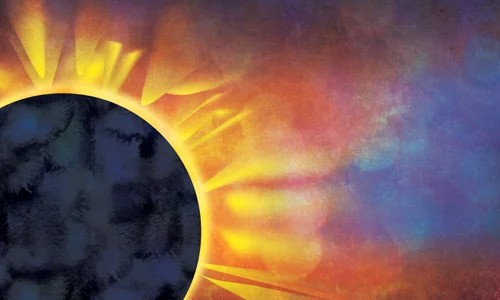|
Getting your Trinity Audio player ready...
|
chabad.org
Question
I have been reading articles about the upcoming solar eclipse. Some claim that eclipses are a bad omen of things to come. What is the Jewish perspective on eclipses?
Also, is there any blessing recited upon witnessing an eclipse? I found blessings for all sorts of phenomena such as lightning, thunder, rainbows and earthquakes, but I see no such blessing for witnessing an eclipse?
Reply
The sages of the Talmud state:
When the luminaries are stricken, it is an ill omen for the world. To what can we compare this? To a king of flesh and blood who prepared a feast for his servants and set a lantern to illuminate the hall. But then he became angry with them and said to his servant: “Take the lantern from before them and seat them in darkness.”1
The Talmud then goes on to describe the particular sins for which the luminaries are “stricken.”
Natural Phenomenon or Bad Omen?
Now that’s puzzling.
The predictability of eclipses was already well known in Talmudic times (the Talmud was completed in the 5th century in Babylonia). And aside from the prevalent scientific knowledge of the day, the sages of the Talmud were well aware of how to calculate eclipses due to their meticulous and complex astronomical calculations for sanctifying the new Jewish month. (Trivia: A solar eclipse can only occur around the time of a new month on the Jewish lunar calendar.)
This leads to the obvious question: How could the sages of the Talmud state that an eclipse is a bad omen caused by our sins? They knew that an eclipse is predictable. But they also certainly believed that sins are not predictable!
To make things yet more puzzling, the Midrash Pirkei d’Rabbi Eliezer—which predates the Talmud—takes both sides of the coin: that eclipses are both a natural astronomical phenomenon as well as a bad sign!2
Eclipses or Sunspots?
Some, most notably Rabbi Yonatan Eibeshitz (1690–1764) in his work Ya’arot Devash, explain that the Talmud’s mention of “stricken luminaries” does not refer to eclipses, but rather sunspots and other such phenomena that darken the sun and do not have a pre-set schedule or determinable cause.3
While this makes for an intriguing theory, there are a number of difficulties with this explanation. For one thing, the Talmud speaks about the moon being “stricken” as well, not just the sun. For another, sunspots themselves are predictable.
Additionally, in the analogy the Talmud provides, the king says, “Remove the lantern from them and let them sit in the dark,” i.e., the luminaries being “stricken” results in our sitting in darkness.4
Constellations and a Predisposition for Good or Bad
The most simple explanation: An eclipse is not caused by sin. Rather, it is an indication of a trying time, a time when there is a natural predisposition for sin, and for strict judgment of that sin.5
Time, in traditional thought, is not homogeneous. The Talmud provides many other examples of the good and bad seasons of time. Certain times are a better opportunity to take specific action. “Most of a person’s wisdom is achieved only at night.”6 Similarly, the early morning is considered an auspicious time for prayer to be received. Being born at certain times creates a predilection for a specific mode of behavior—for good or for the opposite.
Obviously, this does not contradict a fundamental principle of Jewish thought, that human beings have free will. “Freedom is granted to every person,”7 states the Mishnah, whether to be righteous or the opposite.
If so, it is impossible that your innate predisposition should draw you immutably to good or bad; rather, the sign under which you are born merely creates within you a proclivity toward certain behaviors. With effort, you can overcome your natural tendencies, and even transform them.
The same is true regarding eclipses and other “signs in the heavens.” When G‑d created the world, He created signs in the heavens for people to be aware of times when there would be a greater predisposition for sin and punishment. The eclipse itself does not necessarily mean that people will act on that predisposition and actually sin, thereby causing punishment. Rather, it is a generous warning: Take care at this time. Put more effort into doing good. Avoid situations that may tax your moral fortitude.
No Blessing …
In light of the above we can understand why you were unable to find any blessing for witnessing an eclipse. The Lubavitcher Rebbe—Rabbi Menachem M. Schneerson, of righteous memory—explains that since eclipses are meant to be opportunities for increasing in prayer and introspection—as opposed to prompting joyous blessings, we do not recite a blessing when witnessing one.8
… But No Fear
In the creation story at the beginning of the book of Genesis,9 the Torah states, “And G‑d said, “Let there be luminaries in the expanse of the heavens … and they shall be for signs and for appointed seasons and for days and years.” The classic commentaries explain that “they shall be for signs” is a reference to eclipses.10 Thus, we learn that these phenomena are meant to be a sign for us.
At the same time, the prophet Jeremiah proclaims, “Hearken to the word that the L‑rd spoke about you, O house of Israel . . . So says the L‑rd: ‘Of the way of the nations you shall not learn, and from the signs of the heaven be not dismayed…’”11
In other words, these are indeed “signs in the heavens,” yet the prophet tells us that we should not fear them, for, as the sages of the Talmud explain, as long as one acts properly, there is nothing to fear.
See Also





